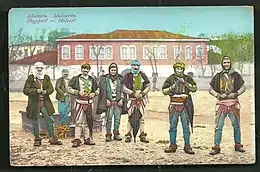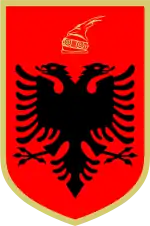Kângë majekrahi
Kângë majekrahi (or Standard Albanian: këngë majekrahi; English: "majekrahi songs", "songs over the arm") alternatively kângë malësorçe (or këngë malësorçe; "mountain songs" or "highland songs")[1][2][3] is a type of "call to action" monophonic male singing or chanting originating from the Northern Albanian mountains among the Albanian Gheg population.[4][3][2]
| Part of a series on |
| Albanian tribes |
|---|
 |
Description
The singing is carried out with a high pitched cry or shriek usually standing on top of a mountain in order to communicate a message, such as the death of a family members, to warn other tribes of enemies entering the valley, or to carry news of a forthcoming wedding party.[5][2] The Rugova highlanders have a tradition of epic verse singing involving a loud cry before leaving for war.[5]
There are several types of songs depending on origin, such as songs with one's finger to close to the ear (këngë me gisht në vesh), songs with a raised arm (këngë majekrahu), war-cry songs (këngë kushtrimi), and wedding guest songs (këngët e krushqve). This type of singing was passed down from one generation to another (Alb. brez pas brezi) and were common among chanting shepherds. Highland songs are sung loudly with a free rhythm, ornaments, interjections and exclamations and other interpretative phenomena.[6] The style has melismatic nuances and falsetto cries.[2] This type of singing is roughly 2000 years old and were first heard when the Romans entered Shkodra.[7] The type of war cries were also common in the time of Skanderbeg. Swedish traditional herding-cries known as locklåtar or 'valley music' are probably close related to the Albanian mountain cries, although they have not the wild force of the kengë malsorqe, which go back right at the beginnings of melody.[7] This type of mountain singing was acceptable among sworn virgins in Albania.[8]
Examples
The following is a translation of the "call to action" song “The Eagle Pledged Its Word”:[3]
“The eagle pledged its word,
Our land we won’t sell,
High stand our ideals,
Our land, may you live as long as the mountains!”
See also
- Albanian singers
- Albanians
- Culture of Albania
- Music of Kosovo
- List of Albanian musicians
References
Citations
- Magrini 2001, p. 295.
- Lloyd 1968, p. 205.
- Shetuni 2011, pp. 30–31.
- "A singing mountaineer, northern Albania. The mountain song is a strange monotonous chant. The ears are pressed and held in the manner shown, apparently to enable the singer to hear himself more accurately and to place his voice in the conventional high falsetto register that makes the song a sort of rhythmical shriek. He also closes his eyes and utterly gives himself up to this voice production". Library of Congress, Washington, D.C. 20540 USA.
- Elsie 2010, p. 245.
- Visar Munishi, Rreze Kryeziu (2001). Kosovo - Kenge Malsore (https://doi.org/10.1093/gmo/9781561592630.article.2293420 ed.). Retrieved 12 December 2019.
- Lloyd 1968, pp. 205–206.
- Bremmer 2014, p. 152.
Bibliography
- Bremmer, Jan N. (2014). From Sappho to De Sade (Routledge Revivals): Moments in the History of Sexuality. Routledge. ISBN 978-1-317-67124-4. Retrieved 12 December 2019.
- Elsie, Robert (2010). Historical Dictionary of Kosovo. Scarecrow Press. ISBN 978-0-8108-7483-1. Retrieved 12 December 2019.
- Lloyd, A. L. (1968). "Albanian Folk Song". Folk Music Journal. 1 (4): 205–222. JSTOR 4521791.CS1 maint: ref=harv (link)
- Magrini, Tullia (2003). Music and Gender: Perspectives from the Mediterranean. University of Chicago Press. ISBN 978-0-226-50165-9. Retrieved 12 December 2019.
- Shetuni, Spiro J. (2011). Albanian Traditional Music: An Introduction, with Sheet Music and Lyrics for 48 Songs. McFarland. ISBN 978-0-7864-8630-4.
